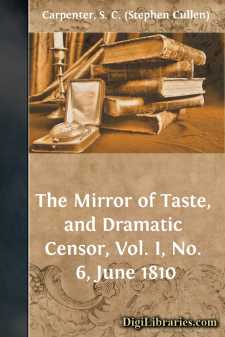Categories
- Antiques & Collectibles 13
- Architecture 36
- Art 48
- Bibles 22
- Biography & Autobiography 816
- Body, Mind & Spirit 145
- Business & Economics 28
- Children's Books 18
- Children's Fiction 14
- Computers 4
- Cooking 94
- Crafts & Hobbies 4
- Drama 346
- Education 58
- Family & Relationships 59
- Fiction 11831
- Foreign Language Study 3
- Games 19
- Gardening 17
- Health & Fitness 34
- History 1378
- House & Home 1
- Humor 147
- Juvenile Fiction 1873
- Juvenile Nonfiction 202
- Language Arts & Disciplines 89
- Law 16
- Literary Collections 686
- Literary Criticism 179
- Mathematics 13
- Medical 41
- Music 40
- Nature 179
- Non-Classifiable 1768
- Performing Arts 7
- Periodicals 1453
- Philosophy 66
- Photography 2
- Poetry 897
- Political Science 203
- Psychology 45
- Reference 154
- Religion 516
- Science 126
- Self-Help 86
- Social Science 82
- Sports & Recreation 34
- Study Aids 3
- Technology & Engineering 59
- Transportation 23
- Travel 463
- True Crime 29
S. C. (Stephen Cullen) Carpenter
Stephen Cullen Carpenter was an Irish-American journalist, writer, and political commentator in the early 19th century. He is best known for writing "Memoirs of Thomas Jefferson" in 1809, which critiqued Jefferson's presidency and policies. Carpenter also authored "The Two Last Republics of North America," exploring the political landscape of the United States and Mexico. His works often focused on government and political philosophy, showcasing his deep engagement with American politics during a time of significant national development.
Author's Books:
Sort by:
Menander, as has been said in the last chapter, once more rescued the stage of Greece from barbarism. In the death of Aristophanes was involved the death of "the middle comedy," which rapidly declined in the hands of his insufficient successors. The poets and wits that came after him, wanted either the talents, the malignity, or the courage to follow his example, to imitate him in his daring...
more...
ORIGIN OF COMEDY—ARISTOPHANES—DEATH OF SOCRATES. Though the term "tragedy" has from the first productions of Æschylus to the present time, been exclusively appropriated to actions of a serious nature and melancholy catastrophe, there is reason to believe that it originally included also exhibitions of a pleasant, or comic kind. The rude satires, and gross mummery which occupied the stage,...
more...
THE ROMAN DRAMA. In proportion as the Romans yielded to the habit of imitating the Greeks, they advanced into refinement, and receded from their characteristic roughness and ferocity. Their pace, however, was very slow, for imagining rudeness and brutality to be synonimous with independence, they indulged and prided themselves in an adherence to their original coarseness and despised the manners of the...
more...
PROSPECTUS. The advantages of a correct judgment and refined taste in all matters connected with literature, are much greater than men in general imagine. The hateful passions have no greater enemies than a delicate taste and a discerning judgment, which give the possessor an interest in the virtues and perfections of others, and prompt him to admire, to cherish, and make them known to the world....
more...





